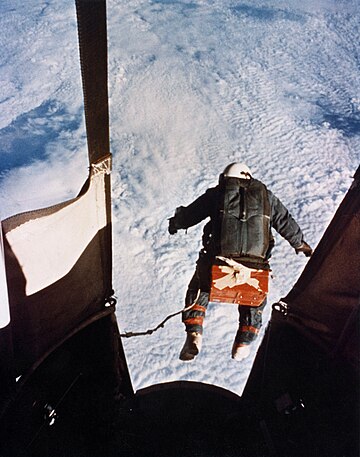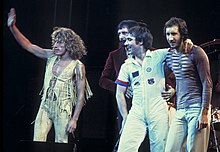Portal:1960s
The 1960s Portal
The 1960s became synonymous with the new, radical, and subversive events and trends of the period. In Africa the 1960s was a period of radical political change as 32 countries gained independence from their European colonial rulers. Some commentators have seen in this era a classical Jungian nightmare cycle, where a rigid culture, unable to contain the demands for greater individual freedom, broke free of the social constraints of the previous age through extreme deviation from the norm. Christopher Booker charts the rise, success, fall/nightmare and explosion in the London scene of the 1960s. However, this alone does not explain the mass nature of the phenomenon. Several nations such as the U.S., France, Germany and Britain turned to the left in the early and mid 1960s. In the United States, John F. Kennedy, a Keynesian and staunch anti-communist, pushed for social reforms. His assassination in 1963 was a stunning shock. Liberal reforms were finally passed under Lyndon B. Johnson including civil rights for African Americans and healthcare for the elderly and the poor. Despite his large-scale Great Society programs, Johnson was increasingly reviled by the New Left at home and abroad. The heavy-handed American role in the Vietnam War outraged student protestors across the globe, as they found peasant rebellion typified by Ho Chi Minh and Che Guevara more appealing. Italy formed its first left-of-center government in March 1962 with a coalition of Christian Democrats, Social Democrats, and moderate Republicans. Socialists joined the ruling block in December 1963. In Britain, the Labour Party gained power in 1964. In Brazil, João Goulart became president after Jânio Quadros resigned. This is a Featured article, which represents some of the best content on English Wikipedia..
The December 1964 South Vietnamese coup took place before dawn on December 19, 1964, when the ruling military junta of South Vietnam led by General Nguyễn Khánh dissolved the High National Council (HNC) and arrested some of its members. The HNC was an unelected legislative-style civilian advisory body they had created at the request of the United States—South Vietnam's main sponsor—to give a veneer of civilian rule. The dissolution dismayed the Americans, particularly the ambassador, Maxwell D. Taylor, who engaged in an angry war of words with various generals including Khánh and threatened aid cuts. They were unable to do anything about the fait accompli that had been handed to them, because they strongly desired to win the Vietnam War and needed to support the Army of the Republic of Vietnam. Instead, Taylor's searing verbal attacks were counterproductive as they galvanized the Vietnamese officers around the embattled Khánh. At the time, Khánh's leadership was under threat from his fellow generals, as well as Taylor, who had fallen out with him and was seeking his removal. The genesis of the removal of the HNC was a power struggle within the ruling junta. Khánh, who had been saved from an earlier coup attempt in September 1964 by the intervention of some younger generals dubbed the Young Turks, was indebted to them and needed to satisfy their wishes to stay in power. The Young Turks disliked a group of older officers who had been in high leadership positions but were now in powerless posts, and wanted to sideline them completely. As a result, they decided to hide their political motives by introducing a policy to compulsorily retire all general officers with more than 25 years of service. The chief of state Phan Khắc Sửu, an elderly figure appointed by the military to give a semblance of civilian rule, did not want to sign the decree without the agreement of the HNC, which mostly consisted of old men. The HNC recommended against the new policy, and the younger officers, led by I Corps commander General Nguyễn Chánh Thi and Air Marshal Nguyễn Cao Kỳ, disbanded the body and arrested some of its members along with other politicians. (Full article...)This is a Good article, an article that meets a core set of high editorial standards.
The Who are an English rock band formed in London in 1964. Their classic lineup (1964–1978) consisted of lead vocalist Roger Daltrey, guitarist Pete Townshend, bassist John Entwistle and drummer Keith Moon. They are considered one of the most influential rock bands of the 20th century. Their contributions to rock music include the development of the Marshall stack, large public address systems, the use of synthesisers, Entwistle's and Moon's influential playing styles, Townshend's feedback and power chord guitar technique, and the development of the rock opera. They are cited as an influence by many hard rock, punk, power pop and mod bands. The Who were inducted into the Rock and Roll Hall of Fame in 1990. The Who evolved from an earlier group, the Detours, and established themselves as part of the pop art and mod movements, featuring auto-destructive art by destroying guitars and drums on stage. Their first single as the Who, "I Can't Explain" (1965), reached the UK top ten, and was followed by a string of hit singles including "My Generation" (1965), "Substitute" (1966) and "Happy Jack" (1966). In 1967, they performed at the Monterey Pop Festival and released "I Can See for Miles", their only US top-ten single. The group's 1969 concept album Tommy included the single "Pinball Wizard" and was a critical and commercial success. (Full article...)Selected picture - Joseph Kittinger sets world records for the highest parachute jump, the longest parachute drogue fall and the fastest speed by a human through the atmosphere after jumping from Excelsior III.
Did you know -
Related portalsThis is a Featured article, which represents some of the best content on English Wikipedia..
George Harrison MBE (25 February 1943 – 29 November 2001) was an English musician, singer and songwriter who achieved international fame as the lead guitarist of the Beatles. Sometimes called "the quiet Beatle", Harrison embraced Indian culture and helped broaden the scope of popular music through his incorporation of Indian instrumentation and Hindu-aligned spirituality in the Beatles' work. Although the majority of the band's songs were written by John Lennon and Paul McCartney, most Beatles albums from 1965 onwards contained at least two Harrison compositions. His songs for the group include "Taxman", "Within You Without You", "While My Guitar Gently Weeps", "Here Comes the Sun" and "Something". Harrison's earliest musical influences included George Formby and Django Reinhardt; subsequent influences were Carl Perkins, Chet Atkins and Chuck Berry. By 1965, he had begun to lead the Beatles into folk rock through his interest in Bob Dylan and the Byrds, and towards Indian classical music through his use of Indian instruments, such as the sitar, which he had become acquainted with on the set of the film Help! He played sitar on numerous Beatles songs, starting with "Norwegian Wood (This Bird Has Flown)". Having initiated the band's embrace of Transcendental Meditation in 1967, he subsequently developed an association with the Hare Krishna movement. After the band's break-up in 1970, Harrison released the triple album All Things Must Pass, a critically acclaimed work that produced his most successful hit single, "My Sweet Lord", and introduced his signature sound as a solo artist, the slide guitar. He also organised the 1971 Concert for Bangladesh with Indian musician Ravi Shankar, a precursor to later benefit concerts such as Live Aid. In his role as a music and film producer, Harrison produced acts signed to the Beatles' Apple record label before founding Dark Horse Records in 1974. He co-founded HandMade Films in 1978, initially to produce the Monty Python troupe's comedy film The Life of Brian (1979). (Full article...)This is a Good article, an article that meets a core set of high editorial standards.
Fidel Alejandro Castro Ruz (/ˈkæstroʊ/ KASS-troh, Latin American Spanish: [fiˈðel aleˈxandɾo ˈkastɾo ˈrus]; 13 August 1926 – 25 November 2016) was a Cuban revolutionary and politician who was the leader of Cuba from 1959 to 2008, serving as the prime minister of Cuba from 1959 to 1976 and president from 1976 to 2008. Ideologically a Marxist–Leninist and Cuban nationalist, he also served as the first secretary of the Communist Party of Cuba from 1965 until 2011. Under his administration, Cuba became a one-party communist state; industry and business were nationalized, and socialist reforms were implemented throughout society. Born in Birán, the son of a wealthy Spanish farmer, Castro adopted leftist and anti-imperialist ideas while studying law at the University of Havana. After participating in rebellions against right-wing governments in the Dominican Republic and Colombia, he planned the overthrow of Cuban president Fulgencio Batista, launching a failed attack on the Moncada Barracks in 1953. After a year's imprisonment, Castro travelled to Mexico where he formed a revolutionary group, the 26th of July Movement, with his brother Raúl Castro and Ernesto "Che" Guevara. Returning to Cuba, Castro took a key role in the Cuban Revolution by leading the Movement in a guerrilla war against Batista's forces from the Sierra Maestra. After Batista's overthrow in 1959, Castro assumed military and political power as Cuba's prime minister. The United States came to oppose Castro's government and unsuccessfully attempted to remove him by assassination, economic embargo, and counter-revolution, including the Bay of Pigs Invasion of 1961. Countering these threats, Castro aligned with the Soviet Union and allowed the Soviets to place nuclear weapons in Cuba, resulting in the Cuban Missile Crisis—a defining incident of the Cold War—in 1962. (Full article...)Selected article - Muhammad Ali (/ɑːˈliː/; born Cassius Marcellus Clay Jr.; January 17, 1942 – June 3, 2016) was an American professional boxer and activist. Nicknamed "the Greatest", he is regarded as one of the most significant sports figures of the 20th century and is often regarded as the greatest heavyweight boxer of all time. He held the Ring magazine heavyweight title from 1964 to 1970. He was the undisputed champion from 1974 to 1978 and the WBA and Ring heavyweight champion from 1978 to 1979. In 1999, he was named Sportsman of the Century by Sports Illustrated and the Sports Personality of the Century by the BBC. Born and raised in Louisville, Kentucky, he began training as an amateur boxer at age 12. At 18, he won a gold medal in the light heavyweight division at the 1960 Summer Olympics and turned professional later that year. He converted to Islam after 1961. He won the world heavyweight championship, defeating Sonny Liston in a major upset on February 25, 1964, at age 22. During that year, he denounced his birth name as a "slave name" and formally changed his name to Muhammad Ali. In 1966, Ali refused to be drafted into the military, owing to his religious beliefs and ethical opposition to the Vietnam War, and was found guilty of draft evasion and stripped of his boxing titles. He stayed out of prison while appealing the decision to the Supreme Court, where his conviction was overturned in 1971. He did not fight for nearly four years and lost a period of peak performance as an athlete. Ali's actions as a conscientious objector to the Vietnam War made him an icon for the larger counterculture of the 1960s generation, and he was a very high-profile figure of racial pride for African Americans during the civil rights movement and throughout his career. As a Muslim, Ali was initially affiliated with Elijah Muhammad's Nation of Islam (NOI). He later disavowed the NOI, adhering to Sunni Islam. (Full article...)More Did you know (auto generated)
TopicsCategoriesWikiProjects
Associated WikimediaThe following Wikimedia Foundation sister projects provide more on this subject:
Discover Wikipedia using portals |






























